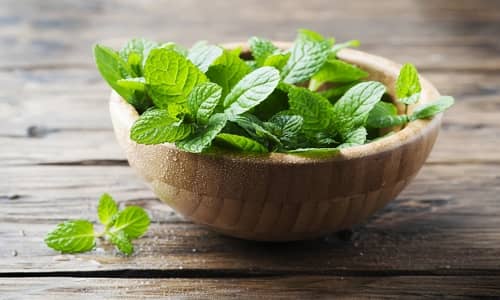Mint benefits, side effects - Good food for depression
Mint Nutrition

| Mint (100g) Nutrition | |||
| Carbohydrate | Protein | Fat | Calories |
| 5g | 3g | 4g | 54kcal |
| Main Nutrition | Vitamin A, Vitamin C, Vitamin D, Vitamin E | ||
| Main Benefits | Improvement of acne, stress and depression | ||
| Side Effects | It is recommended to avoid consumption if breastfeeding. | ||
Mint is one of the oldest culinary herbs known to mankind. Its amazing medicinal properties have made it one of the most commonly known and used herbs. Mint leaves are full of antioxidants and phytonutrients, contain vitamin A, vitamin C, B complex, phosphorus, calcium, and have antibacterial properties. It is one of the rich sources of iron, potassium and manganese, which improve hemoglobin levels and promote brain function.
2. Mint Benefits

1. Strengthen your immune system
Mint is rich in phosphorus, calcium and vitamins such as C, D, E and A, which boost the body’s immune system. It also protects cells from damage, reducing the risk of chronic disease. Mint contains menthol. This is an aromatic decongestant that can help break up phlegm and mucus, making it easier to expel. Additionally, mint leaves may prevent tumor formation by inhibiting some enzymes.
2. Stress management
Mint is a natural stimulant and just the smell can make you feel good. The scent of mint can be used in aromatherapy to combat stress. The mint scent is soothing and helps relax the brain and body. Mint also has adaptogenic properties that regulate cortisol levels and build natural resilience to stress.
3. Gastrointestinal health
Mint helps stimulate the digestive system by stimulating digestive enzymes. Mint not only has antiseptic and antibacterial properties that help relieve indigestion, gastrointestinal infections, and more, but it also helps with irritable bowel syndrome, a common disorder of the digestive system. Mint contains a compound called menthol, which has a relaxing effect on the muscles of the digestive tract and acts as an antispasmodic.
4. Skin care
Mint is an ancient medicine that treats skin-related problems such as acne and scars. Mint’s powerful antibacterial, antifungal, and anti-inflammatory properties make it effective in treating acne, lowering inflammation and redness associated with acne flare-ups. Mint contains salicylic acid and vitamin A, which regulates sebum secretion in the skin and helps treat acne. Mint’s rich menthol and natural antioxidants make it an amazing cleanser, toner, astringent and moisturizer for the skin. Mint brightens the skin and soothes dry, itchy skin. It is also a common ingredient in oils that are good for the skin.
3. MintHow to make tea
4. Mint Side Effect
- It is recommended that people with gastroesophageal reflux disease minimize their consumption of mint as it can cause gastrointestinal irritation.
- Excessive consumption of mint can cause a bitter taste and weaken the body’s energy.
- Mint has a milk-suppressing effect, so it is recommended to avoid consumption by those who are breastfeeding.